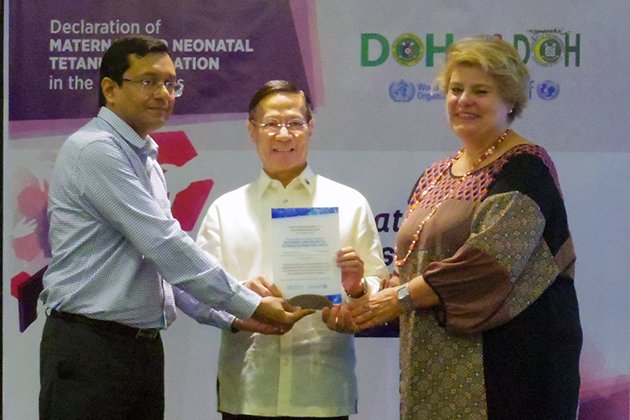The Philippines has beaten tetanus among mothers and newborns, the Health Department announced Wednesday.
The country achieved the Maternal and Neonatal Tetanus Elimination (MNTE) status, which is given to a nation when there is less than one case of neonatal tetanus per 1,000 live births in every province or city there.
After 30 years working against tetanus, the Philippines is the 44th country to reach this health milestone. Prior to the announcement, it was also one of the last 16 countries that had not yet eliminated the disease.
Health Department records show 52 cases of infants with tetanus between January and September this year, of which 34 died.
"The health department faced numerous challenges to reach even isolated and conflict-affected communities, teaching the importance of clean birth deliveries attended by a medical professional and convincing pregnant and reproductive age women to get vaccinated with tetanus-toxoid containing vaccine," Health Secretary Francisco Duque III said in a statement.
Criteria for the elimination status include at least 80 percent of children protected after birth, 80 percent deliveries being clean, and 80 percent of deliveries being facility-based.
Tetanus is acquired when dirt with tetanus spores enter open wounds or breaks in the skin, sometimes through injections or the cutting of the umbilical cord. Women can get infected if unclean tools are used in childbirth or abortion.
Symptoms include muscular stiffness, muscle spasms, sweating, and fever. Newborn babies with tetanus also stop sucking between three to 28 days after birth.
The disease is particularly fatal to infants, with the World Health Organization (WHO) estimating it caused the deaths of 49,000 newborns worldwide in 2013.
However, tetanus can be combatted through immunization vaccines.
Both the United Nations Children's Fund (UNICEF) and WHO lauded the Philippines' efforts. UNICEF Philippine Representative Philippines Lotta Sylwander urged the tetanus-free status be maintained by strengthening the Maternal Neonatal and Child Health program.
"This includes the vaccination of all women of reproductive age with tetanus-toxoid containing vaccine, at least four prenatal visits for pregnant women, and by ensuring that babies are delivered by skilled health personnel in a health facility," Sylwander said.
A statement from WHO noted the Philippines' commitment to achieving the Sustainable Development Goal of good health and well-being.
The goal to eradicate tetanus among newborns and mothers is an offshoot of the previously set Millennium Development Goals (MDGs) to reduce child mortality, improve maternal health, and combat HIV/AIDS, malaria, and other diseases. The MDGs were goals that 191 United Nations members agreed to work toward by 2015.
While the Philippines has yet to eradicate HIV/AIDS and provide adequately for reproductive health, the achievement of eliminating tetanus brings the country closer to these international health goals.
It also contributes to the fulfillment of President Rodrigo Duterte's first guarantee of the health agenda: cater to all life stages and the triple burden of disease (communicable diseases, non-communicable diseases, and diseases of rapid urbanization and industrialization). In particular, achievement of the MNTE status achieves targets of immunization, a healthy first 1,000 days, and maternal, newborn, and child health.


No comments:
Post a Comment